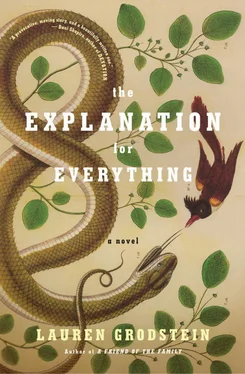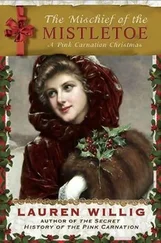“How do I find you again? If you’re not coming back to Princeton?”
“You call me,” she said, making it sound like an instruction. He called her. She called him back. That easy. They were married at the Princeton Faculty Club in front of forty people a year later, her parents from Arizona, his mother from Ohio. Rosenblum did the officiating, which was a service he provided to all comers so that no man would be forced to interact with clergy in order to participate in a state institution, like marriage.
Lou promised she would nurture him. Andy promised he would take care of her for the rest of her days. They honeymooned in Paris, he wrote his dissertation in their tiny studio in Philadelphia, and once he was officially Dr. Waite, they moved to Miami for his postdoc. There, she worked twelve-hour shifts in the NICU of Kendall Regional. He performed EEGs on rats. At night, in the air-conditioned haven of their moderately priced apartment in Quail Run (“Whence the quail?” she would ask. “Where do they run?”) they would lie together in their bed and imagine their future children.
Twelve years later: two children, a tenure-track job at a small liberal arts college in southern New Jersey, an office with a geriatric computer and a parking-lot view. A basement lab. Three dozen mice. No Lou.
He had never grown used to her absence, but he had learned to endure it, and to ignore her ghost, who was often waiting for him around the corner, or behind him in the office when he thought he was alone. He used to talk to her; during his first several years in New Jersey he talked to her several times a day. She would smirk or nod or roll her eyes, as expressive in death as she had been in life. When he said something to her she didn’t believe, she would laugh silently. But when he told her, “I like it here, Lou, and I’m doing okay,” she didn’t laugh, even though he was lying. When he told her, “I guess I’ll stay here for the rest of my life,” and looked up to meet her eyes, he found her looking away, and then disappearing, a magic trick.
Would he stay here for the rest of his life? He supposed he would, if he got tenure. And this was where he thought about what Rosenblum often told him about tenure: it’s like a prison in all the bad ways—you know where you’ll be stuck for the rest of your life—but in the good ways too, since you’ll always know where your next meal’s coming from. He had filed his paperwork just before he took off for the summer. It had felt, in some small way, like resignation.
Still, he did enjoy his reputation as a campus provocateur. On the first day of the fall 2011 semester, a Septemberish breeze blowing in his hair, Jackson Browne on the radio (“Doctor My Eyes”), it was pleasant to imagine himself a seasoned academic off to raise undergraduate hackles at the dawn of a bright new school year. Sure, yes, everything would be all right. There was a crease in his Dockers, a glimmer in his eye as he drove his girls to school. “You’re teaching There Is No God, huh?” Rachel asked when he dropped them off.
“How did you know?”
“You’re whistling.”
His morning class, colloquially called There Is No God (Special Topics in Evolutionary Biology: Ethics and Debate, Course B:413), was one he taught every third semester, subject to demand. It was a distillation of a similar course Hank Rosenblum had originated at Princeton, but whereas the Princeton course drew consternation, even controversy, the Exton Reed version was delivered to students who were happy to swallow whatever they were fed. Which, in this case, was a big bowl of Darwinian theory spiced with a few contemporary major thinkers: Dawkins; Dennett; Rosenblum, of course (who, despite his downfall, was still considered a player in the evolution game). The students were generally seniors, most of whom had no particular feeling for or against Darwin. The hard-core religious types, the Campus Crusaders for Christ, tended to stay away, although occasionally a few of them would infiltrate for purposes of either changing Andy’s mind or reminding their classmates that fellowship and pizza were available in the campus center Thursday evenings from seven to nine.
At a larger school, a research-oriented biologist like Andy almost certainly wouldn’t be allowed to teach a course like this; it would be given to a social scientist or an evolutionary theorist. But at Exton Reed, eleven hundred students and forty-two acres of crumbling quad hidden in the ass end of New Jersey, there was nobody else even interested in teaching There Is No God, much less capable of it. The other members of his department included a seventy-year-old microbiologist, a politically rowdy ornithologist, a grumpy botanist, and a fashionable ecologist who taught the department’s global warming seminar with appropriate hysteria. The five of them rotated through the teaching of biology’s academic cornerstones: the 101, 102, 201 rotation required to get kids into med school or master’s programs. They hired adjuncts to oversee labs. They kept boxes of dead frogs and fetal pigs in the cafeteria’s deep freezer. They rarely socialized.
At 8:17, Andy pulled into the faculty parking lot, collected his briefcase, straightened his tie. He was still whistling. He was glad to be getting on with things. He had forced himself, this summer, to try to relax—his tenure paperwork was in, after all, and he knew his file looked good: three conference papers, two published articles, a mini-grant from the New Jersey Institute of Research Science. Possible important progress with his mice. So now all he could do was wait until April for the board’s final decree. Yet although he’d planned to spend his summer reading historical biographies and camping with his girls, he found himself, by July, prone to long bouts of desolation. He worried constantly about what he’d do without tenure, tried to come up with Plan Bs. He could teach at a high school (even though the thought of high school students made him fearful and exhausted). He could work in someone else’s lab (but whose?). He could use the hours the girls were at school to obsessively clean the house.
But now, as the campus shifted into new-semester gear, Andy found himself crossing its weedy gravel pathways with optimism, almost delight. He stopped in the campus center for a cup of coffee and became immersed in unusually nimble chitchat with the barista, the janitor, a student who looked familiar but whose name he couldn’t place. By the time he opened the door to his fourth-floor office in Scientific Hall, he felt almost—yes, there it was—he felt cheerful.
Louisa’s ghost nodded her greeting to him as he opened the door. He had expected to see her, but he said nothing to her, and soon enough she shimmered away.
EXTON REED WAS small, but also perversely overcrowded; as a result, there was nowhere to teach There Is No God but the tiny seminar room on the top floor, the fifth floor, of Scientific Hall, searingly hot and serenaded by the whoosh of the building’s plumbing, as a network of drainpipes ran across the ceiling. Scientific Hall, like most of Exton Reed’s buildings, dated from the 1950s, when the smell of GI profits convinced the trustees of the Exton Ladies’ Institute of Reed Township to transform their small, underfunded finishing school into a small, underfunded liberal arts college. Scientific Hall went up in the northeast corner of the quad, where it stood opposite the campus center and freshman dorms; in the adjacent corner hulked Carruthers, the humanities building, named for Exton Reed’s major donor, the Carruthers family of Carruthers Cranberry. In the middle of the quad stood an oversized statue of Henrietta Exton, who founded the Exton Ladies’ Institute at the end of the eighteen hundreds. Inscribed on the statue’s pedestal were several inspirational themes and quotations translated into Latin, including the campus’s motto, ABOVE ALL, RHETORIC, which only Andy seemed to find amusing.
Читать дальше












